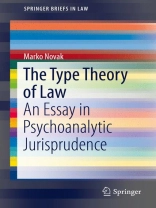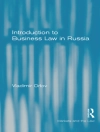This volume presents a Type Theory of Law (TTL), claiming that this is a unique theory of law that stems from the philosophical understanding of Jung’s psychological types applied to the phenomenon of law. Furthermore, the TTL claims to be a universal, general and descriptive account of law. To prove that, the book first presents the fundamentals of Jungian psychological types, as they had been invented by Jung and consequently developed further by his followers. The next part of the book describes how the typological structure of an individual determines their understanding of law. It then addresses the way in which inclusive legal theory can be understood based on this typology. Finally, the book describes the TTL in general and descriptive terms and puts it into context. All in all, the book shows how the integral or inclusive approach to understanding the nature of law is not only in tune with our time, but also relevant for presenting a more persuasive picture of law than the older exclusivist or dualist approaches of strict natural law and rigid legal positivism did.
Tabela de Conteúdo
Introduction.- 1 Integral Theories of Law.- 2 Understanding Law and Legal Practice Through Jungian Type Theory.- 3 Historical Types of Law.- 4 A Psychological-Typological Reading of Integral Theories of Law.- 5 The Type Theory of Law.
Sobre o autor
Marko Novak Born in 1967. LL.B. and LL.D. from Ljubljana University Faculty of Law, LL.M. from Georgetown University Law Center (U.S.). More than a decade a legal advisor at the Slovene Constitutional Court. Now associate professor of legal theory and constitutional law. Dean of the European Faculty of Law, Slovenia. Vice-president of the Slovene Council for the Judiciary. Academic writings mainly from the area of psychoanalitic jurisprudence and legal argumentation.












